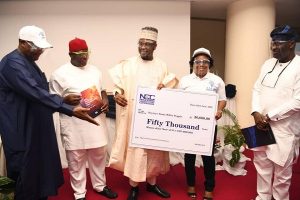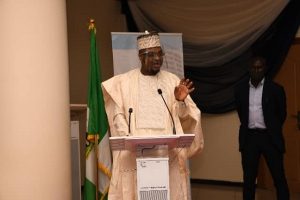Telecom
Pantami Explains How NCC’s Strategic Management Plan Will Drive Digital Economy
Dr. Isa Ali Ibrahim Pantami, minister of Communications and Digital Economy, has described the new Strategic Management Plan (SMP) 2020-2024 by the Nigerian Communications Commission (NCC) as a pedestal to drive the implementation of the Federal Government’s digital economy vision.
Pantami stated this during the virtual launch of NCC’s five-year strategy plan in Abuja on Tuesday which was attended by few invited officials from the Federal Ministry of Communications and Digital Economy, the Nigerian Communications Commission, other sister parastatals under the Ministry as well as critical Stakeholders in the telecoms sector, who joined the launch virtually in compliance with the Federal Government’s directives on social distancing.

L-R: Prof. Umar Danbatta, Executive Vice Chairman, Nigerian Communications Commission (NCC), Senator Obinna Ogba, Member, Senate Committee on Communications, Dr. Isa Ali Ibrahim Pantami, Minister of Communications and Digital Economy, Onyinye Willie-Pepple, Principal Manager, Licensing & Authorisation, NCC/winner, Quiz on SMP for NCC Staff; and Prof. Adeolu Akande, during the virtual launch of the Strategic Management Plan (SMP) 2020-2024 in Abuja on Tuesday.
According to the Minister, the launch of the SMP demonstrated the Commission’s serious improvement in performance matrix and its efforts in accelerating the implementation of the National Digital Economy Policy and Strategy (NDEPS) and the National Broadband Plan (NBP) 2020 – 2025 of the Federal Government.
“I feel very excited for the fact that there is a serious improvement in the performance of the Nigerian Communications Commission (NCC).
“The launch of this SMP 2020 – 2024 is a clear indication of that. When a parastatal is performing, it will create an innovative idea on how to be more successful.
“When a parastatal is not performing, you will not hear anything on how to implement policies and come up with different strategies and plans,” he said.
The Minister stated that despite the enhanced performance of NCC, there is a need for the Commission to redouble its efforts.

Dr. Isa Ali Ibrahim Pantami, minister of Communications and Digital Economy addressing audience at the launch.
“We need to challenge and ridicule our previous successes by setting new records through the implementation of this SMP 2020 – 2024. The NCC Management must ensure effective implementation of this SMP,” he added.
Earlier, Prof. Umar Danbatta, executive vice chairman (EVC) of NCC, said the SMP is the fulcrum that will aid the NCC in driving its telecom regulatory mandate in the fast evolving telecoms industry, in the next five years.
He said it will serve as a roadmap for the future of the Nigerian telecoms sector, taking into consideration the current and emerging trends in the industry and the numerous expectations of the diverse Stakeholders.
“The Federal Government’s economic diversification plans are focused on a robust digital economy, which will improve employment generation, as well as encourage innovation.
“This was prime in our minds during the formulation of the SMP. We have invested great time and effort in ensuring that this document is pragmatic, and I am very confident and excited in its completeness to successfully guide the Commission in achieving the set objectives. We are committed to the implementation of this SMP,” the EVC said.
Senator Oluremi Tinubu, chairman Senate Committee on Communications, who was represented by Senator Obinna Ogba praised the Commission for its exemplary performance and averred that the new SMP 2020 – 2024 would ensure the Commission is on course to deliver on the mandate of the Federal Government for a digital economy. Distinguished Senator Tinubu wished the Commission success in implementing the Plan.
Speaking in the same vein, Ms Helen Obi, deputy director, Corporate Planning, Strategy and Risk Management, said the development of the new SMP for the next five years was initiated with the lapse of the previous one and it would help the Commission to effectively harness its internal resources to deliver on expectations of its external stakeholders and the industry as whole.
“Our primary goal in organising the launch, therefore, is to present the finished work to our esteemed stakeholders and solicit your buy-in and support in ensuring that our shared vision and mission of providing best-in-class regulatory services towards achieving a digitized economy is sustainably accomplished,” she added.

Prof. Umar Danbatta, executive vice chairman (EVC) of NCC, addressing audience at the launch.
In their goodwill messages to the Commission, the Chairman, Association of Licensed Telecom Operators of Nigeria (ALTON), Gbenga Adebayo; President, Association of Telecoms Companies of Nigeria (ATCON), Olusola Teniola and President, National Association of Telecoms Subscribers (NATCOMS), who joined the launch virtually, congratulated the Commission and expressed their view that the SMP 2020 – 2024 will add the needed impetus to the implementation of national digital economy policy of the government.
Over 700 estimated guests, including representatives of ministries, departments and agencies (MDAs), Chief Executives of telecoms companies, the media, among others, joined the launch online.
At the same time, over 2,400 viewers watched the Facebook live video during the SMP launch.
Telecom
MTN Nigeria Shops for N50Bn Commercial Paper to Boost Working Capital
MTN Nigeria Communications Plc has announced plans to issue up to N50bn in Series 13 and 14 Commercial Paper Notes under its N250bn Commercial Paper Issuance Programme.

This proposed issuance aligns with the company’s strategy to broaden its funding sources and strengthen its liquidity position.
The proceeds from the issuance are earmarked to support MTN Nigeria’s short-term working capital needs, enabling the company to sustain its operations and meet financial obligations effectively.
In a statement to the Nigerian Exchange Limited (NGX) and the investing public, MTN Nigeria emphasized its commitment to maintaining financial stability and operational efficiency.
According to the statement signed by Uto Ukpanah, company secretary, further details regarding the structure, pricing, and timeline of the issuance will be disclosed to the market in due course, as MTN Nigeria continues to engage with stakeholders and regulatory authorities.
MTN Nigeria recently completed its series 10 commercial paper issuance under its upsized N250bn commercial paper issuance programme.
The telecom giant said it sought to raise N72.1bn and the offer recorded 149 per cent subscription with N72.1bn issued.
The 266-day commercial paper was issued on 29 November 2023 at a yield of 16 per cent.
The CP issuance aligns with MTN Nigeria’s strategy to continue diversifying its funding sources and reducing its average cost of debt. The proceeds will be applied towards short-term working capital requirements.
Karl Toriola, chief executive officer, MTN Nigeria said. “We are pleased with the support received from the investor community, having recorded a 149 per cent subscription from a broad range of investors. This reflects NTN Nigeria’s robust financial capacity, brand strength, and market leadership amidst the upward pressure on interest rates”
Stanbic IBTC Capital Limited played the role of Arranger and Dealer with ARM Securities Limited. Chapel Hill Denham Advisory Limited, Coronations Marchant Bank Limited, FCMB Capital Markets Limited, Quantum Zenith Capital &Investments Limited, Rand Marchant Bank Limited, and Vetiva Capital Management Limited played the role of Joint Dealers on the transaction.
Telecom
FG Plans Four New Satellites as Part of Tinubu’s Renewed Hope Agenda
President Bola Ahmed Tinubu has said that Nigeria will launch four satellites as part of his administration’s Renewed Hope Agenda.

Bola Ahmed Tinubu
Tinubu said this at the opening ceremony of the 25th Anniversary of Nigeria in Space in Abuja.
The anniversary celebration was organised by the National Space Research and Development Agency (NASRDA) in collaboration with the Nigeria Communication Satellite Limited (NIGCOMSAT) and the Defence Space Administration (DSA).
Tinubu, represented by Chief Uche Nnaji, minister of Innovation, Science, and Technology, stated that space was previously exclusive to developed countries, but the foresight of Nigerian leaders facilitated the passing of the Space Act that led to the establishment of NASRDA in 1999.
“Space is an area of limitless opportunities and one in which the advanced countries of the world are relentlessly discovering how the opportunities can be tapped for their advantage.
“It is obvious that Nigeria cannot afford to lag in this global quest of discovering space and how the knowledge from such discoveries can help in solving her internal issues for national development,” he said.
NASRDA has made efforts to develop major space programs in collaboration with the Nigerian Military to develop capacity in the use of space for tactical services, among others.
“Today, the synergy between NASRDA, NigComSat, and DSA has led to a tripodal support upon which an advanced and more robust national space program will be built in the near future.”
“All these giant strides made by this important sector of our dear country are notable and noble with the launch of seven satellites, and efforts are on top gear to launch an additional four satellites within the lifespan of this administration.”
“Great effort should be made to ensure that the private sector is mainstreamed into the heart of our space program for us to do more in the coming years for our national development,” President Tinubu said.
The President also emphasised the need to strengthen the NASRDA Act to help the Nigerian space ecosystem be more vibrant in its engagements, locally and internationally.
“Similarly, the sector will require improved budgetary support to be able to accomplish its programs, whose outcomes can bring massive socioeconomic dividends to Nigeria and her citizens.
“This will also solidify Nigeria’s standing as a leading space-faring country in Africa and further boost her image to competitively attract foreign direct investment because of our locational advantage for cheaper launching services.”
“This restates our administration’s commitment to continue to support the space program to accelerate technological and innovative development.”
In his remarks, Nnaji, who was represented by Mrs. Esuabana Nko-Asanye, Permanent Secretary of the ministry, said the World Economic Forum’s 2024 report projected the global space economy to reach about 1.8 trillion dollars by 2035.
The minister added that the growth would be driven by advances in satellite technology and industries like supply chain logistics and agriculture, among others.
He stated that the growth would also impact the aerospace sector and communications and was expected to generate over 60 percent of the new economic value from space-enabled technologies.
“Space technology offers transformative solutions to global challenges, from monitoring climate change and managing natural resources to enhancing disaster response capabilities.
“Reduced costs and heightened accessibility will encourage increased participation from non-space sectors, integrating space into the fabric of global infrastructure,” the minister said.
He commended the President for recognising the role of space technology in the Renewed Hope Agenda and approving some projects for the agency.
“The President approved for the replacement of NASRDA’s Earth Observation satellites, ensuring the regulation of oversight functions of all space activities in the country and utilisation of space technology to monitor federal government revenues.”
Nnaji called on NASRDA to capitalise on the support of the federal government by expanding its revenue base through partnerships with the private sector.
According to him, the key areas of private sector engagement include commercial space travel, development of satellite technology, resource utilisation, investment in Low Earth Orbit (LEO) ventures, and technology transfer to drive industrial growth.
Earlier, Dr Matthew Adepoju, director-general of NASRDA, recalled that over the past 25 years, the Nigerian Space Program had been a beacon of Nigeria’s aspirations in space exploration and development, thereby placing the country on the global map of space-faring nations.
The DG disclosed that President Tinubu’s administration had recently approved the development of four satellites, which included a Synthetic Aperture Radar (5AR) satellite and the first in Africa.
“This transformative project will be executed under a public-private partnership, ensuring the infusion of expertise and investment to accelerate implementation.
“These satellites will significantly enhance our capabilities in areas such as precision agriculture, disaster management, national security, and urban planning while contributing to global scientific advancements.
“Furthermore, we are guided by the recent Presidential directive to integrate space technology into the operations of all revenue-generating agencies, departments, and ministries in Nigeria.
“This directive underscores the strategic importance of space technology in enhancing efficiency, transparency, and accountability across government functions, ultimately contributing to national development.
“Nigeria’s space assets—including NigeriaSat-1, NigeriaSat-2, and NigeriaSat-X, NigComSat-1, among others—are vital tools for national development.
“These satellites have supported critical disaster management, urban activities in security, health, agriculture, disaster immense value to planning, and broadband connectivity, advancing our nation’s reputation as a space-capable country,’’ he said.
Telecom
Airtel Nigeria Gets Dinesh Balsingh as New CEO
Airtel Africa, a telecommunications and mobile money services provider with presence in 14 countries across the continent, has appointed of Dinesh Balsingh as the Managing Director and Chief Executive Officer of Airtel Nigeria, effective 1st November 2024. By this appointment, Balsingh also becomes a member of the Executive Council for the Airtel Africa Group.

He takes over from Carl Cruz, who returned to his home country, The Philippines, at the end of October.
Balsingh has extensive experience across the telecommunications industry and returns to Nigeria following his appointment as Managing Director and CEO of Airtel Tanzania in 2022. Prior to his move to Tanzania, he served as the Chief Commercial Officer (CCO) at Airtel Nigeria and therefore brings with him considerable experience of the Nigerian telecommunications market.
Balsingh’s career in the telecommunications industry spans over 24 years, having begun his career in 2000 with Hutchison Essar, before moving to Airtel India as a Marketing Director in 2006 and then Tata Docomo in 2011. Balsingh joined Airtel Nigeria as Marketing Director in 2013, before taking over as CCO in 2018.
During his tenure in Airtel Tanzania, Balsingh led the business to achieve record growth through intelligent pricing, product enhancements and disciplined execution of projects, resulting in strong Revenue Market Share (RMS) gains in the highly competitive market.
Speaking on the leadership changes, Airtel Africa Chief Executive Officer, Sunil Taldar said, “Mr. Balsingh’s deep telecommunications experience and strong operational execution, combined with his knowledge of the Nigerian market, will be instrumental in further supporting our corporate purpose of transforming lives across Nigeria.”
Balsingh holds a Master of Business Administration from Thiagarajar School of Management.

 Telecom3 days ago
Telecom3 days agoNCC, CBN to Resolve Telecoms, Banks’ USSD Debt Issue

 Telecom3 days ago
Telecom3 days agoProf. Adewale Obadare Shares Key Insights on Breaking into Cybersecurity

 Telecom3 days ago
Telecom3 days ago9mobile CEO Highlights Key Solutions for Securing Electronic Money Transfers in Africa

 E-Business3 days ago
E-Business3 days agoNITDA DG Harps on the Role of Innovation in Nigeria’s Sustainable Development

 News2 days ago
News2 days agoCourt Orders Arrest of Echefu, Businessman over Alleged $651,280 Fraud

 Broadcasting3 days ago
Broadcasting3 days agoFirst Women Radio Virtual Assistant Makes a Debut in Nigeria

 E-Financial3 days ago
E-Financial3 days agoPalmPay Reaffirms Commitment to Ensuring a Safe Financial Ecosystem @ Anti-Fraud Walk

 News3 days ago
News3 days agoN57Bn Theft Allegations: SERAP Calls on Tinubu to Investigate Buhari




























